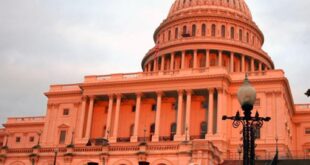 TEHRAN (FNA)- The United States signed an agreement pledging civilian atomic energy cooperation with Bahrain after concerns that Iran’s preparedness to transfer nuclear technology to regional and Muslim states could enhance regional solidarity.
TEHRAN (FNA)- The United States signed an agreement pledging civilian atomic energy cooperation with Bahrain after concerns that Iran’s preparedness to transfer nuclear technology to regional and Muslim states could enhance regional solidarity.
“The agreement signed today reflects Bahrain’s commitment to serve as a model in the region,” the US State Department said in a statement.
Meantime, the Persian Gulf Arab state affirmed its intention to avoid “sensitive” nuclear arms-related technology and rely on world markets for nuclear fuel in an effort to prevent Washington from spreading the rumor that Iran’s nuclear progress has provoked nuclear rivalry in the region.
According to the statement, US Secretary of State Condoleezza Rice signed the memorandum of understanding with her counterpart from Bahrain, Sheikh Khaled al-Khalifa.
The US cites its willingness to cooperate on nuclear power in arguing that Iran should give up uranium enrichment in exchange for help fulfilling its energy needs. Tehran faces a third set of economic sanctions approved March 3 by the United Nations Security Council pressing for an end to Iran’s nuclear enrichment.
Bahrain hosts the US Navy’s 5th Fleet, which patrols the Persian Gulf’s oil shipping lanes.
Signing the nuclear agreement is part of Bahrain’s overall development strategy, the country’s embassy in the US said today in a statement.
“It aims to ensure the stability and diversity of its energy supplies,” the embassy said, citing declining domestic oil and gas supplies and soaring demand worldwide.
The US is at loggerheads with Iran over Tehran’s independent and home-grown nuclear technology. Washington has laid much pressure on Iran to make it give up the most sensitive and advanced part of the technology, which is uranium enrichment, a process used for producing nuclear fuel for power plants.
Washington’s push for additional UN penalties contradicted the recent report by 16 US intelligence bodies that endorsed the civilian nature of Iran’s programs. Following the US National Intelligence Estimate (NIE) and similar reports by the IAEA head – one in November and the other one in February – which praised Iran’s truthfulness about key aspects of its past nuclear activities and announced settlement of outstanding issues with Tehran, any effort to impose further sanctions on Iran seemed to be completely irrational.
The February report by the UN nuclear watchdog, the International Atomic Energy Agency, praised Iran’s cooperation in clearing up all of the past questions over its nuclear program, vindicating Iran’s nuclear program and leaving no justification for any new UN sanctions.
Tehran says it never worked on atomic weapons and wants to enrich uranium merely for civilian purposes, including generation of electricity, a claim substantiated by the NIE and IAEA reports.
Iran has insisted it would continue enriching uranium because it needs to provide fuel to a 300-megawatt light-water reactor it is building in the southwestern town of Darkhovin as well as its first nuclear power plant in the southern port city of Bushehr.
Not only many Iranian officials, including President Mahmoud Ahmadinejad, but also many other world nations have called the UN Security Council pressure unjustified, especially in the wake of recent IAEA reports saying Iran had increased cooperation with the agency.
US President George W. Bush, who finished a tour of the Middle East last month has called on his Arab allies to unite against Iran.
But hosting officials of the regional nations dismissed Bush’s allegations, describing Tehran as a good friend of their countries.
Bush’s attempt to rally international pressure against Iran has lost steam due to the growing international vigilance, specially following the latest IAEA and US intelligence reports.
 Eurasia Press & News
Eurasia Press & News



